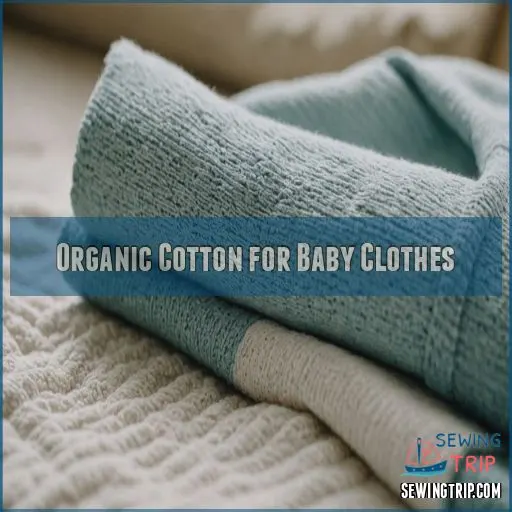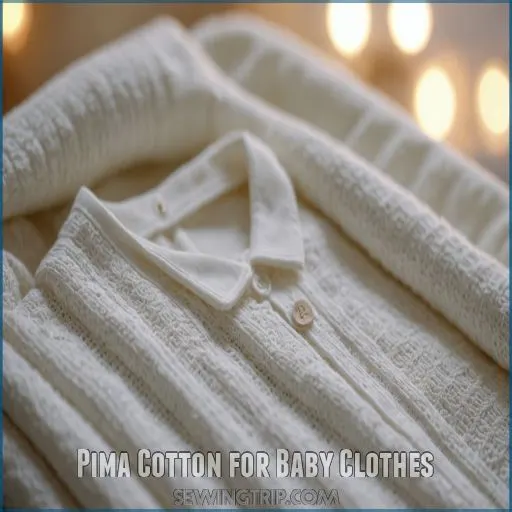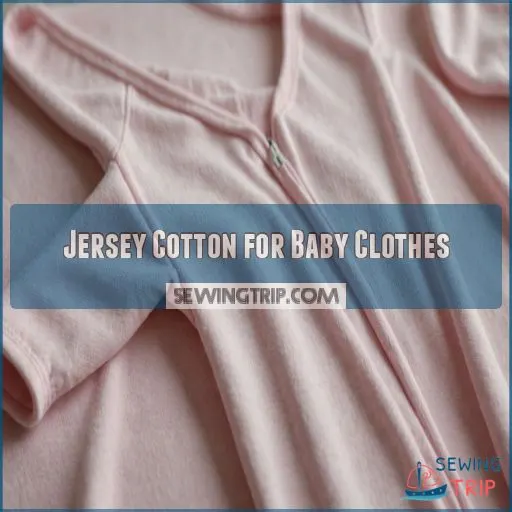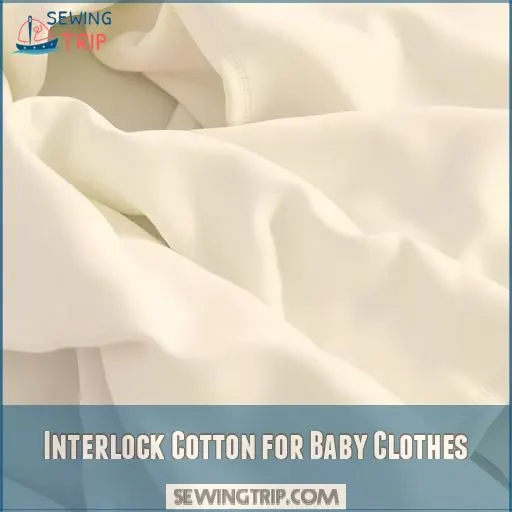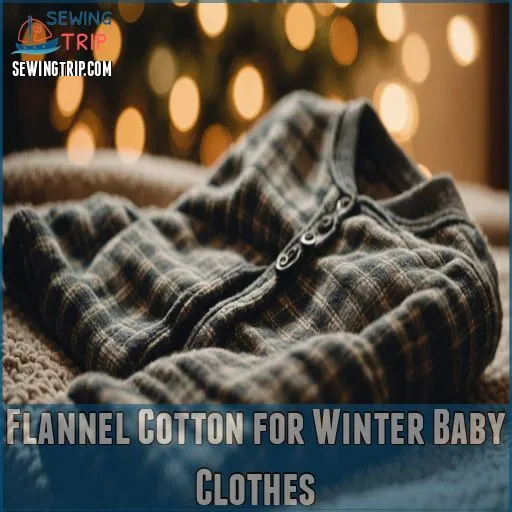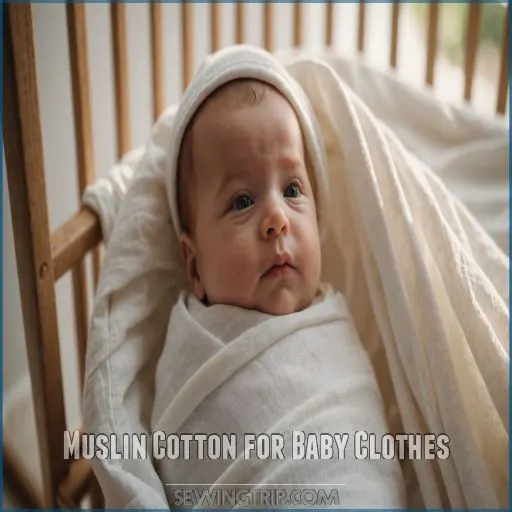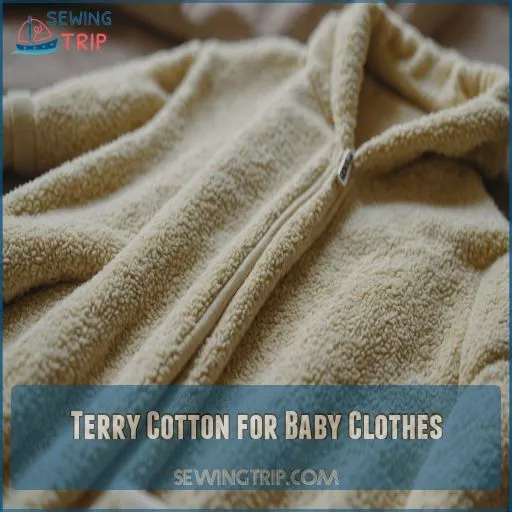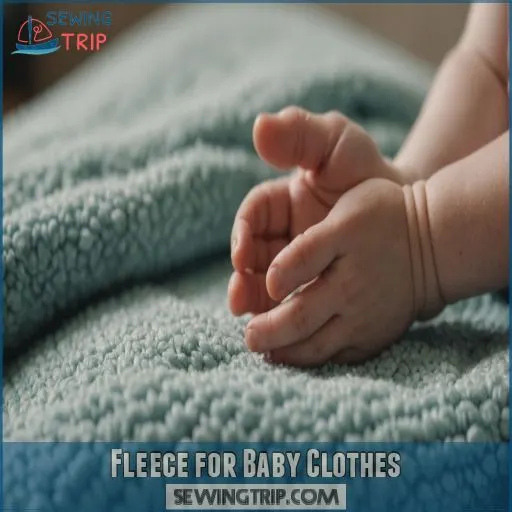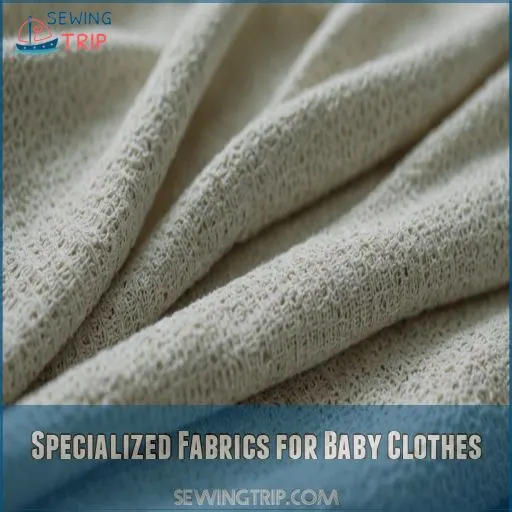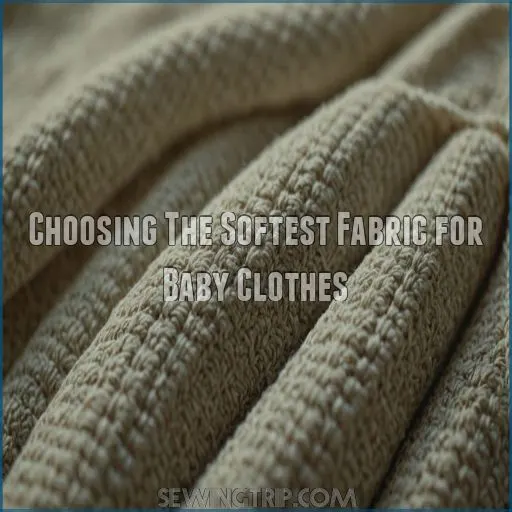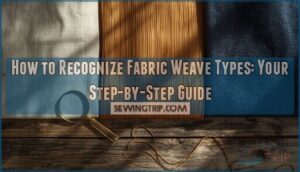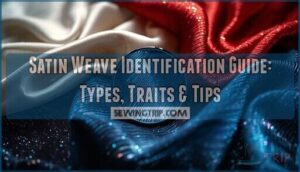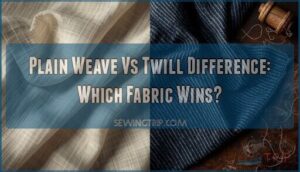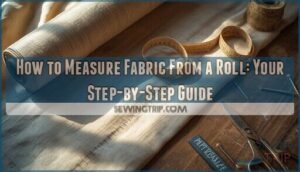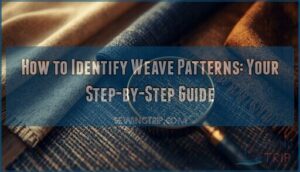This site is supported by our readers. We may earn a commission, at no cost to you, if you purchase through links.
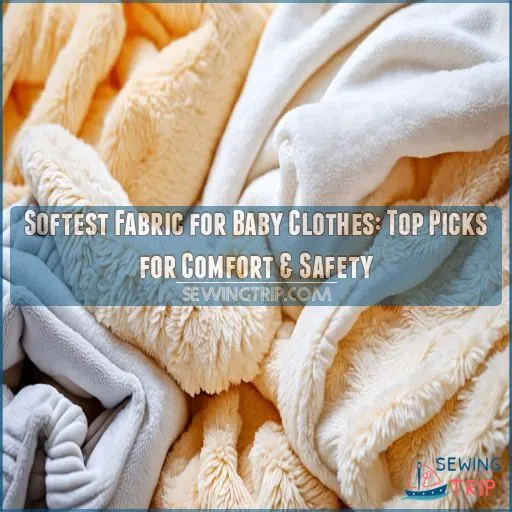 When it comes to dressing your little one in the softest fabrics, you can’t go wrong with organic cotton, pima cotton, or jersey cotton.
When it comes to dressing your little one in the softest fabrics, you can’t go wrong with organic cotton, pima cotton, or jersey cotton.
These natural fibers are gentle on sensitive skin, breathable, and durable enough to withstand countless washes.
For extra warmth in the winter, flannel cotton is a cozy choice.
And don’t forget about specialized fabrics like bamboo rayon and merino wool – they offer amazing temperature regulation and moisture-wicking properties.
No matter which soft fabric you choose, you can rest assured your baby will be comfortable and safe.
Now, let’s explore the details on why these are the top picks for the softest baby clothes.
Table Of Contents
- Key Takeaways
- Organic Cotton for Baby Clothes
- Pima Cotton for Baby Clothes
- Jersey Cotton for Baby Clothes
- Interlock Cotton for Baby Clothes
- Flannel Cotton for Winter Baby Clothes
- Muslin Cotton for Baby Clothes
- Terry Cotton for Baby Clothes
- Fleece for Baby Clothes
- Specialized Fabrics for Baby Clothes
- Choosing The Softest Fabric for Baby Clothes
- Frequently Asked Questions (FAQs)
- Conclusion
Key Takeaways
- Choose organic and natural fabrics. When it comes to soft fabrics, cotton has been a popular choice for centuries due to its natural absorbency, breathability, and softness against the skin, as seen in its 8 reasons to use cotton. Opt for organic cotton, pima cotton, and jersey cotton for their breathability, hypoallergenic properties, and comfort on sensitive skin. These materials are also sustainable and eco-friendly.
- Focus on softness and durability. Pima cotton offers luxurious softness and durability, making it perfect for active babies. It’s also moisture-wicking, keeping your baby comfortable during playtime.
- Prioritize breathable materials. Fabrics like muslin cotton and jersey cotton are lightweight and breathable, ideal for preventing overheating in warmer climates and during active moments.
- Consider temperature regulation. Specialized fabrics like bamboo rayon and merino wool offer excellent temperature control and moisture-wicking properties, ensuring your little one stays cozy without overheating.
Organic Cotton for Baby Clothes
When you choose organic cotton for your baby’s clothes, you’re picking a fabric that’s as gentle on their skin as a lullaby.
It’s not just soft and hypoallergenic; it also cares for our planet by being sustainable and free of harmful chemicals.
Soft and Gentle on Sensitive Skin
Organic cotton’s unmatched softness makes it a top pick for your baby’s sensitive skin.
It’s like wrapping your baby in a gentle hug, keeping them snug and comfy without a single worry.
Free from irritating chemicals, this fabric is eczema-friendly and kind to delicate skin.
You won’t fret about fabric allergies, allowing you peace of mind.
Sustainable and Eco-Friendly
Choosing organic cotton for your baby’s clothes means you’re embracing sustainability and comfort, like wrapping them in a warm hug from Mother Earth.
It’s a gentle fabric that avoids greenwashing concerns, with eco-friendly dyes and recycled fabrics.
Organic farming and sustainable production practices mean your choice benefits both your baby and the planet.
Plus, it’s as soft as a cloud.
Hypoallergenic Properties
Your baby’s sensitive skin deserves the best.
Organic cotton, a hypoallergenic hero, minimizes fabric allergies.
Chemical-free, it’s as pure as a mother’s love.
Consider these points:
- Natural fibers: Opt for skin-friendly options.
- Wool alternatives: Great for skin sensitivity.
- Soft fabric: Embrace comfort with pima, jersey, or interlock cotton.
Organic cotton guarantees your baby’s safety.
Breathable and Comfortable
A breathable and comfortable fabric is essential for your little one’s delicate skin.
Organic cotton, with its natural breathability and temperature-regulating properties, is an excellent choice.
This soft, hypoallergenic fabric allows air circulation, preventing overheating and keeping your baby cozy and content.
| Fabric | Breathability | Temperature Regulation |
|---|---|---|
| Voile Cotton | Excellent | Moderate |
| Lawn Cotton | Very Good | Good |
| Chambray Cotton | Good | Excellent |
Pima Cotton for Baby Clothes
For baby clothes, Pima cotton’s longer fibers make it an exceptionally soft choice, providing a luxurious touch that won’t irritate delicate skin.
You’ll appreciate its durability and moisture-wicking properties, perfect for keeping your little one comfortable, even during active playtimes.
Longer Fibers for Extra Softness
After appreciating how organic cotton pampers delicate skin, consider Pima cotton, famous for its longer fibers, which bring a touch of luxury to baby clothes.
These fibers enhance softness while maintaining durability, making Pima cotton a parent favorite.
Imagine wrapping your little one in this fabric, softer than a whisper—a true delight for your baby’s tender skin.
Luxurious and Durable Option
Pima cotton, a luxurious and durable option, feels like butter against your baby’s skin.
It’s a true gem among luxury fabric trends, featuring longer fibers for unmatched softness and resilience.
While its cost might give you pause, remember you’re investing in sustainable luxury that endures countless washes without losing its charm.
It’s like wrapping your baby in a cozy cloud.
Excellent Moisture-Wicking Properties
Imagine your baby enjoying the coziness of Pima cotton’s excellent moisture-wicking properties.
This fabric keeps their skin dry and comfortable, whether they’re napping or playing.
Unlike absorbent fabrics, Pima cotton manages moisture by drawing it away, making it perfect for sleep sacks and summer baby clothes.
Just remember, wicking fabrics need careful wash care to maintain their benefits.
Perfect for Active Babies
For active little ones, Pima cotton is a fantastic choice.
With its long fibers, it provides durability and softness, making it ideal for kids’ clothes.
Additionally, this breathable fabric helps regulate temperature, allowing your baby to stay comfortable.
- Stretchy fabrics for easy movement
- Durable materials withstand playtime
- Easy care for busy parents
Jersey Cotton for Baby Clothes
Choosing jersey cotton for your baby’s clothes is like giving them a gentle hug all day long.
Jersey cotton‘s softness, breathability, and stretchiness make sure your baby stays comfortable and happy while discovering the world.
Soft and Gentle on Baby’s Skin
Jersey cotton is a soft, gentle fabric that’s perfect for baby clothes.
Its stretchy, flexible nature allows for easy movement, while its breathable properties help prevent overheating.
Plus, it’s a cinch to care for – just toss it in the wash and you’re good to go.
With its comfy feel and practical benefits, jersey cotton is a top choice for dressing your little one.
| Attribute | Description |
|---|---|
| Softness | Exceptionally soft and gentle on sensitive skin |
| Breathability | Allows air circulation to prevent overheating |
| Flexibility | Stretchy and flexible for easy dressing and movement |
Breathable and Prevents Overheating
Next up on the comfort list, let’s talk jersey cotton.
This summer fabric ranks high for baby clothes because it breathes like a champ, keeping your little one cool and happy.
With natural fibers and the right fabric weight, it prevents overheating, giving your baby the chill factor they need without breaking a sweat.
Perfect choice, right?
Stretchy and Flexible for Ease of Movement
As you explore breathable fabrics, consider jersey cotton for your baby’s activewear.
This material allows freedom of movement, giving your little one comfort during playtime.
Its fabric stretch makes movement a breeze, letting those tiny limbs party like it’s 1999!
Choose jersey cotton for baby clothes, and watch your child explore the world with unmatched ease and movement comfort.
To minimize potential issues like stretching and rippling when sewing with jersey cotton, mastering the right sewing techniques is key.
Easy to Care for and Maintain
While stretchy for baby’s movement, this fabric’s charm is its easy care: machine washable, quick-drying, and wrinkle-resistant .
Tackle laundry with these tips:
- Wash in cold water for fabric longevity.
- Use gentle detergents for eco-friendly care.
- Air dry or tumble on low to avoid shrinkage.
- Master stain removal hacks for stress-free cleanup.
Jersey cotton simplifies your laundry routine!
Interlock Cotton for Baby Clothes
When you’re looking for baby clothes that can handle rough play and countless washes, interlock cotton’s got your back with its sturdy double-knit structure.
Thicker and more durable than jersey cotton, it’s less likely to stretch out of shape, ensuring your little one’s outfit remains snug and comfy.
Double-Knit Construction for Durability
Think of interlock cotton as your little one’s armor against the wear and tear of daily adventures.
This double-knit wonder provides durability without sacrificing comfort.
Unlike its single-knit cousin, jersey, interlock maintains its shape, offering peace of mind.
You’ll appreciate the fabric’s longevity and the way it keeps your baby snuggled in comfort.
Thicker and More Substantial Than Jersey Cotton
Interlock cotton is a great choice for baby clothes, offering a thicker and more substantial feel than jersey cotton. It provides durability and comfort, making it perfect for your little one. Here’s why:
- Soft on delicate skin
- Offers snug warmth
- Resists wear and tear
- Ideal for colder months
- Enhances body comfort with gentle weight.
Less Likely to Stretch Out of Shape
Cotton’s natural fibers wick moisture away from the body, making it an ideal choice for baby clothes, especially when considering is cotton breathable. A trusty interlock cotton fabric is your go-to choice for baby clothes that won’t stretch out of shape.
This double-knit construction offers exceptional durability, ensuring your little one’s outfits maintain their fit and form even after countless washes.
Bid farewell to saggy knees and elbows – interlock cotton is the key to clothing longevity.
| Feature | Benefit |
|---|---|
| Durable Knit | Resists tearing and fraying |
| Wrinkle-Resistant | Maintains shape and appearance |
| Breathable | Keeps baby comfortable |
| Versatile | Suitable for various garments |
| Eco-Friendly | Available in organic options |
Flannel Cotton for Winter Baby Clothes
When winter chills set in, you’ll want your baby wrapped in the cozy softness of flannel cotton, a fabric known for its warmth and versatility.
This breathable, durable material is perfect for layering, ensuring your little one stays both snug and comfortable throughout the colder months, and it might even inspire some seasonal cooing contests.
Soft and Cozy for Cold Weather
Flannel cotton wraps your baby in a hug of warmth and comfort during chilly winter days.
It’s a softer choice for layering tips, providing excellent breathability and air circulation.
Unlike wool that can sometimes itch, flannel doesn’t scratch delicate skin.
For winter outfit ideas, this fabric balances warmth vs. comfort admirably with cozy flannel alternatives.
Versatile and Durable Option
Winter baby clothes made from flannel cotton are a blend of durability and softness, providing fabric longevity that every parent appreciates.
This material is wash-resistant, so it withstands multiple trips through the laundry without losing its charm.
Plus, stain resistance makes it a superhero against those inevitable baby messes, allowing you to keep your little one warm without fuss (Source).
Breathable and Allows Air Circulation
With cold weather on the horizon, you might be eyeing that soft, cozy flannel cotton.
It’s not just about warmth; this fabric excels in breathability, allowing air circulation and preventing overheating, even in chilly temperatures.
Its ability to regulate temperature makes it great for winter wear, keeping your baby comfy without trapping too much heat—a parent’s dream fabric!
Perfect for Layering and Winter Wear
You’ll adore flannel cotton for winter baby clothes—a warm fabric offering excellent layering tips for chilly days.
It’s as if you’re bundling your baby in a cozy cocoon, ensuring comfort without sacrificing breathability.
To make sure your baby’s skin stays comfortable, consider opting for organic cotton, a ultra-gentle choice breathable fabric options.
Consider flannel alongside fleece benefits and other wool alternatives to keep your little one snug.
It’s just right for those icy-windy mornings.
Muslin Cotton for Baby Clothes
Muslin cotton is your go-to fabric for baby clothes, offering lightness and breathability that’s perfect for swaddles or diaper covers.
Its airy texture keeps babies comfortable, making it an ideal choice for warm climates or active little ones.
Just don’t be surprised if your bundle of joy starts napping more often!
Lightweight and Breathable Fabric
Muslin cotton is a lightweight, breathable fabric that’s perfect for keeping your little one cool and comfortable during the warmer months.
This natural fiber is soft, gentle on sensitive skin, and allows air to circulate, making it an ideal choice for summer baby clothes.
Muslin’s loose weave also makes it great for swaddles and diaper covers.
Ideal for Swaddle Clothes and Diaper Covers
Choosing muslin cotton for swaddle clothes and diaper covers feels like wrapping your baby in a cloud.
This fabric is soft, breathable, and safe:
- Naturally lightweight and airy
- Gentle on sensitive skin
- Ideal for wrapping and snuggling
- Reduces overheating risks
- Easy to wash and maintain
Muslin also pairs beautifully with bamboo, organic, and jersey materials for added comfort.
Terry Cotton for Baby Clothes
If you’ve ever tackled a spaghetti stain with a washcloth, you’ll appreciate terry cotton’s absorbency for baby clothes.
It’s not just great for towels; it’s also gentle on your little one’s skin, making every cuddle a cozy delight.
Soft and Absorbent Fabric
Cotton, with a range of textures based on type, processing, and weaving as explained in cotton’s many textures, offers a variety of soft options, with some like Pima or Egyptian becoming smoother with washing, making terry cotton your go-to for baby clothes that require a soft touch and absorbency.
This fabric boasts a plush texture that’s heaven for delicate skin, perfect for curious tots who spill and drool.
Easy care instructions make it a lifesaver for busy parents.
But to achieve the best results it’s important to prepare terry cloth correctly to prevent shrinkage and maintain its plush texture.
Remember, fabric testing makes certain it remains safe and cozy for your little one.
Perfect for Towels and Washcloths
For towel and washcloth fabric, terrycloth tops the list.
It’s incredibly absorbent and perfect for homemade towels and careful washcloth care.
Balancing cotton vs. bamboo, terrycloth provides unmatched softness.
It’s like wrapping your baby in a cloud—minus the rain!
So, opt for terrycloth uses that promise both practicality and comfort for your little one.
Gentle on Baby’s Skin
While towels and washcloths offer excellent absorbency, terry cotton shines with its gentle touch, essential for baby’s sensitive skin.
This chemical-free fabric helps prevent skin irritation and fabric allergies, ensuring comfort during wearing.
Natural fibers like terry cotton make sensitive skin care a breeze, wrapping your baby in softness. It’s like giving your little one a cozy hug all day.
Fleece for Baby Clothes
Fleece is the perfect fabric for keeping your little one warm and cozy during the colder months.
Its lightweight, moisture-wicking properties make it an ideal choice for winter clothes and accessories that’ll keep your baby comfortable all season long.
Lightweight and Moisture-Wicking Fabric
Considering lightweight and moisture-wicking fabrics for baby clothes, fleece stands out for its excellent fabric performance, offering a plush comfort and warmth similar to a gentle hug what does fleece feel like.
Its features make it ideal for summer clothes and athletic wear thanks to its breathable options and moisture control.
Remember these perks:
- Breathable to keep your baby comfortable.
- Quick-drying, perfect for spills.
- Soft texture offers unrivaled comfort for sensitive skin.
Keeps Baby Warm and Cozy
Imagine you’re wrapping your little one in fleece pajamas, like a warm hug on a frosty day. This lightweight, moisture-wicking fabric keeps your baby cozy without overheating—perfect for layering under wool blankets or cozy sleepwear during chilly nights.
| Baby Item | Feature | Benefit |
|---|---|---|
| Fleece Pajamas | Lightweight Fabric | Keeps Warm |
| Wool Blanket | Heat Retention | Extra Comfort |
| Cozy Sleepwear | Breathable | Promotes Relaxation |
Selecting the right winter baby clothes can be a game-changer!
Perfect for Winter Clothes and Accessories
Fleece is perfect for winter baby gear, offering warmth without weight. You’ll appreciate these benefits:
- Layering Tips: Fleece options are great for layering, keeping cold at bay.
- Wool Benefits: While wool is cozy, fleece’s synthetic nature avoids itchiness.
- Cozy Accessories: Consider fleece hats and mittens, providing snug comfort for little explorers.
Fleece is both practical and comfy!
Specialized Fabrics for Baby Clothes
When choosing specialized fabrics for baby clothes, you have options like bamboo rayon, which is soft on sensitive skin, and merino wool, perfect for regulating temperature.
For practical needs, consider waterproof fabrics for cloth diapers and microfiber materials that make laundry a breeze, leaving more time for giggle sessions.
Bamboo Rayon for Sensitive Skin
Parents love fleece for warmth, but for sensitive skin, bamboo rayon is a real game-changer.
Silky soft and hypoallergenic, it’s a great option for comfort.
Bamboo rayon shines in moisture management and temperature regulation, keeping your little one cool and comfy.
It’s softer than cotton, eco-friendly, and easy care.
Take a peek:
| Feature | Bamboo Rayon |
|---|---|
| Softness | Ultra-soft |
| Allergy-friendly | Hypoallergenic |
| Moisture-wicking | Excellent |
| Care | Easy, non-pilling |
Waterproof Fabrics for Cloth Diapers
When choosing waterproof fabrics for cloth diapers, there are several options to keep both your baby dry and your mind at ease.
Consider these top picks:
- Eco-PUL: Versatile and durable.
- Polyester Fleece: Soft and snug.
- TPU: Eco-friendly and leak-proof.
- Nylon: Lightweight and quick-drying.
These options offer reliable protection with minimal fuss.
Merino Wool for Temperature Regulation
Merino wool‘s temperature-regulating properties make it an excellent choice for baby clothes.
This soft, breathable fabric keeps your little one comfortable, whether it’s hot or cold.
Plus, it’s hypoallergenic and easy to care for – just hang items up to air and occasionally use a gentle wool wash.
Woolino’s merino wool sleep sacks are a cozy, safe option for your baby’s slumber. (Source)
Microfiber Fabrics for Easy Care
After exploring Merino’s warmth, consider microfiber—a superhero in baby clothes for its easy care and impressive durability. It offers a snug fit without the bulk. And cleaning? A breeze.
- Less prone to wear and tear.
- Softer than you’d expect.
- Outshines cotton in longevity.
- Low allergy potential.
- Simple washing tips save time.
Choosing The Softest Fabric for Baby Clothes
When choosing the softest fabric for your baby’s clothes, prioritize comfort and breathability to keep your little one cozy and happy.
Look for materials that wick away moisture, ensuring your baby stays comfortable even during an unexpected naptime adventure.
Prioritize Softness and Comfort
Picking the perfect fabric for baby clothes can feel like going through a fabric jungle.
Prioritize comfort and softness to keep your little one wrapped in a cozy hug.
Opt for natural fibers like organic cotton or bamboo, known for being gentle on sensitive skin.
For more tips on understanding fabric softness, consider factors like durability and texture.
Here’s a handy table to guide your choices:
| Fabric Choice | Comfort Tips |
|---|---|
| Organic Cotton | Soft, hypoallergenic |
| Bamboo | Moisture-absorbing |
| Merino Wool | Temperature regulating |
| Jersey Cotton | Stretchy, easy to move in |
Consider Breathability and Moisture-Wicking Properties
Choosing the right fabric for your baby’s clothes can feel like walking a tightrope.
Breathability and moisture-wicking properties help Baby Comfort, Temperature Control, and Skin Sensitivity be well-managed.
Consider these fabrics:
- Cotton for breathability
- Bamboo for moisture-wicking
- Merino wool for temperature regulation
- Jersey cotton for flexibility
- Fleece for warmth
Remember, your Fabric Choice matters!
Look For
When selecting fabric for your baby’s clothes, consider fabrics that are gentle on sensitive skin, such as organic cotton options, look for certifications that guarantee safety and quality.
Seek out ethically sourced materials to make sure you’re making a responsible choice.
Consider the fabric weight for seasonal comfort and ease of care.
Durability ratings help determine longevity, so your baby’s favorite outfit withstands countless washes.
After all, who doesn’t love dependable clothes?
Frequently Asked Questions (FAQs)
What is the softest fabric for baby clothes?
Imagine a world where clouds cuddle your baby—bamboo fabric is just that soft.
It’s eco-friendly, hypoallergenic, and incredibly durable.
You’ll love its moisture-wicking properties, ensuring your little one stays dry and comfy all day.
What is the best fabric for baby clothes & accessories?
Cotton, particularly organic cotton, stands out as the best fabric for baby clothes and accessories.
It’s breathable, hypoallergenic, and soft, ensuring comfort and safety.
Bamboo offers excellent alternatives with its moisture-wicking and thermal properties.
What fabrics should a baby wear?
Your baby should wear fabrics as soft as a gentle breeze, like bamboo, organic cotton, and merino wool.
These materials are breathable, hypoallergenic, and comfortable, helping your little one stay cozy while minimizing skin irritations.
Which fabric is best for babies with sensitive skin?
For babies with sensitive skin, choose organic cotton or bamboo fabrics.
They’re gentle, breathable, and free from harsh chemicals, providing comfort and safety.
Plus, bamboo’s eco-friendly nature makes it a great choice for your little one.
What is the softest fabric for baby clothes?
Imagine finding unexpected treasures in your laundry—bamboo fabric is incredibly soft and hypoallergenic, making it perfect for baby clothes.
It absorbs moisture, resists wear, and withstands many washes, keeping your little one comfortable and happy.
What is the best material for babies to wear?
Cotton, bamboo, and merino wool are excellent choices for baby clothes.
They’re soft, breathable, and hypoallergenic, keeping your little one comfortable.
Consider the climate and your budget when selecting the best material.
How can I make my baby’s clothes softer?
Picture clothes as soft as a cloud hugging your baby.
Skip fabric softeners; they irritate sensitive skin and reduce fire resistance.
Instead, wash on gentle cycles with baby detergent and pre-soak stubborn stains for extra comfort.
What is the softest fabric for clothing?
You’ll find cashmere remarkably soft; it’s like a warm hug from a cloud on a chilly day.
Silk, with its smooth, luxurious texture, also feels divine.
Both are excellent choices for the softest clothing materials.
What fabrics are best for summer baby clothes?
Did you know that breathable fabrics like linen, gauze, and bamboo can keep your baby up to 3 degrees cooler in summer?
These choices prevent sweating, ensuring comfort, while being soft and hypoallergenic for sensitive little ones.
How to care for bamboo baby clothing?
To care for bamboo baby clothing, wash it in cold water on a gentle cycle, using mild detergent.
Air-dry flat to prevent stretching.
Avoid fabric softeners and bleach, and consider a laundry bag for added protection.
Are woolen fabrics suitable for newborns?
Woolen fabrics are indeed suitable for newborns.
They offer excellent temperature regulation, keeping babies cozy without overheating.
Woolen fabrics are also breathable, non-toxic, and naturally insulating.
Plus, a snug woolen blanket feels like a warm hug from grandma (Source).
Which fabrics resist pilling effectively?
Coincidentally, fabrics like KARUISHI and merino wool effectively resist pilling thanks to their durable construction and abrasion-resistant properties. These high-performance materials keep your clothes looking fresh for longer.
What is the softest sustainable baby fabric?
You’ll adore TENCEL Lyocell for baby clothes, as it’s one of the softest sustainable fabrics around.
It combines gentle eco-friendliness with comfort, enveloping your little one like a cloud, ensuring they feel safe and snug.
Conclusion
When it comes to your baby’s comfort, you want to wrap them in nothing less than the softest cloud imaginable.
The softest fabric for baby clothes, like organic cotton, pima cotton, and bamboo rayon, guarantees coziness and peace of mind for parents.
These materials offer unmatched softness, breathability, and durability, making them ideal for sensitive skin.
Choosing the right fabric isn’t just about style—it’s a step in the direction of your baby’s health and comfort.
So go ahead, make the best choice for your little one!

